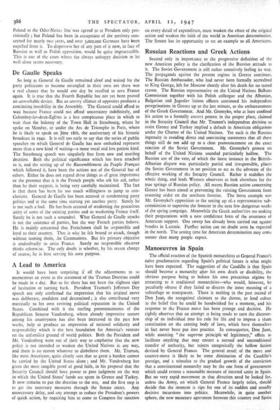De Gaulle Speaks
So long as General de Gaulle remained aloof and waited for the party politicians to become entangled in their own net there was a real chance that he would one day be recalled to save France again. It is true that the Fourth Republic has not yet been proved an unworkable device. But an uneasy alliance of opposites produces a continuing instability in the Assembly. The General could afford to wait because France could not afford uncertainty indefinitely, and Colombey-les-deux-Eglises is a less conspicuous place in which to wait than the balcony of the Town Hall in Strasbourg, where he spoke on Monday, or under the Arc de Triomphe in Paris, where he is likely to speak on Pine ath, the anniversary of his historic broadcast in 1940. It is still too early to say that the series of public speeches on which General de Gaulle has now embarked represent more than a new kind of waiting—a more vocal and less patient kind. The Strasbourg speech was singularly free from new and startling doctrine. Both the political significance which has been attached to it, and the setting up of the Rassemblement du Peuple Francais which followed it, have been the actions not of the General but of others. Either he does not regard these things as of great importance or the pretence that it is the French people who ask his aid, rather than he their support, is being very carefully maintained. The fact is that there has been fat too much willingness to jump to con- clusions. General de Gaulle has been accused ot condemning party politics and at the same time starting yet another party. Surely he is not such a fool. He has been accused of weakening the precarious unity of some of the existing parties and so weakening France itself. Surely he is not such a scoundrel. What General de Gaulle attacks is not the existence of parties, but the way French parties behave. He is mainly concerned that Frenchmen shall be responsible and loyal to their country. That is. why he felt bound to attack, though without naming them, he Communists. But his primary objective is undoubtedly to unite France. Surely no responsible observer thinks otherwise. The only doubt is whether, by his recent change ' of course, he is best serving his own purpose.


































 Previous page
Previous page